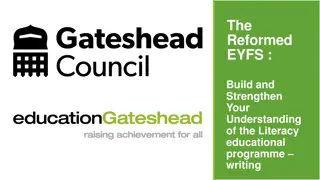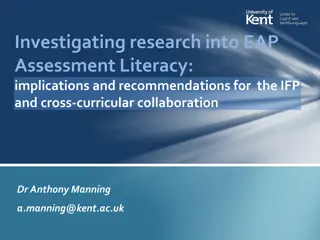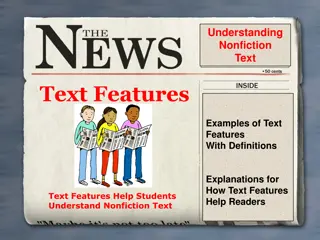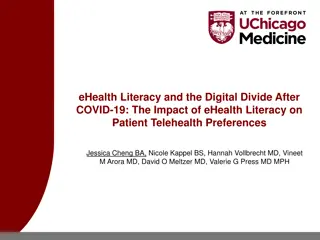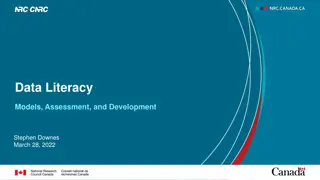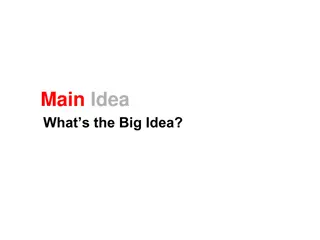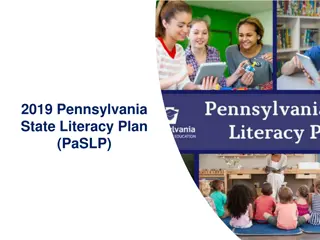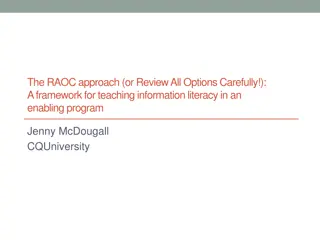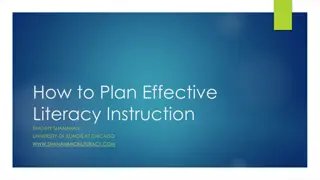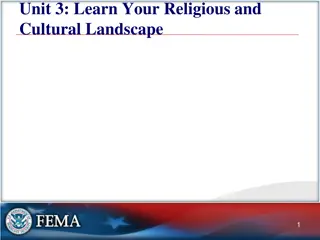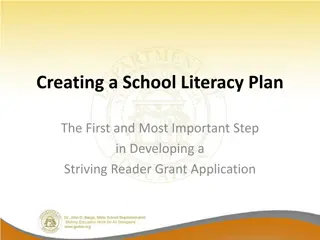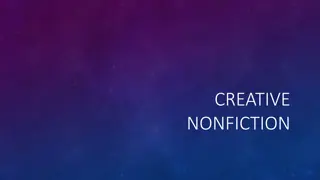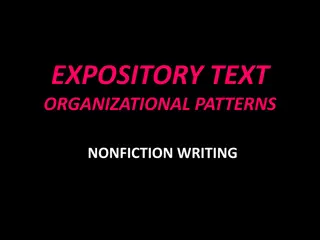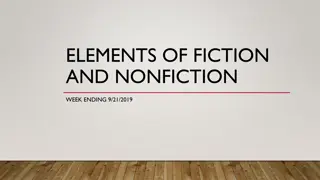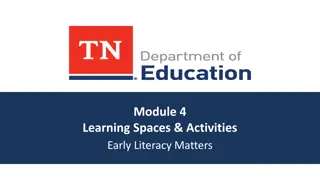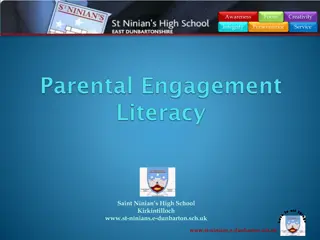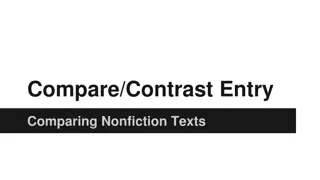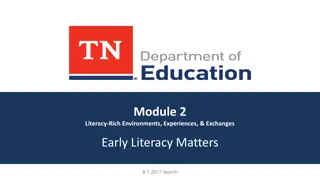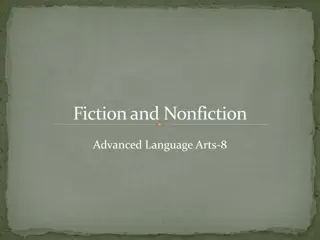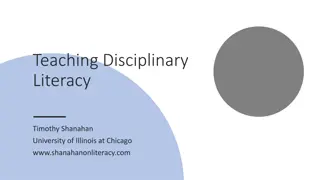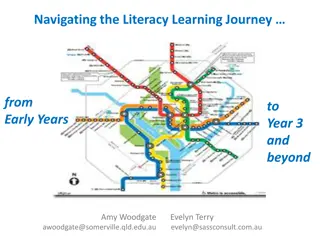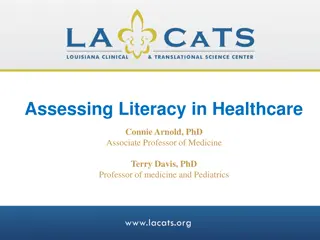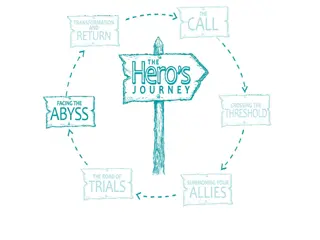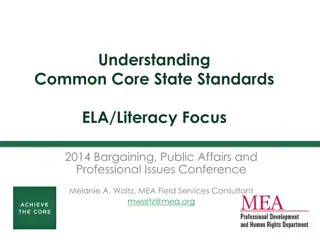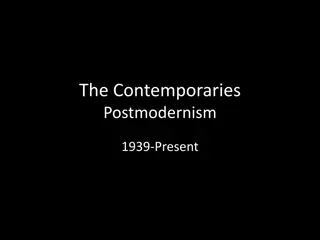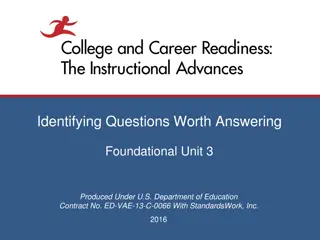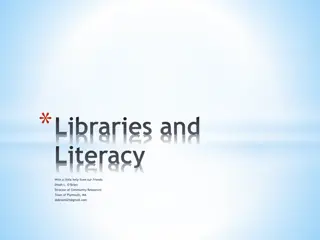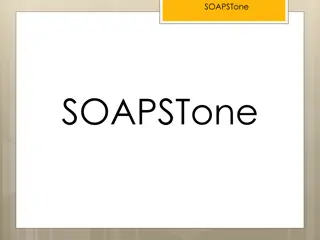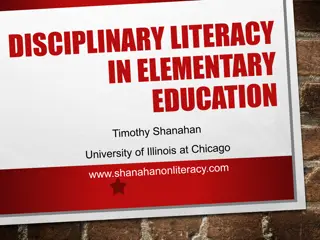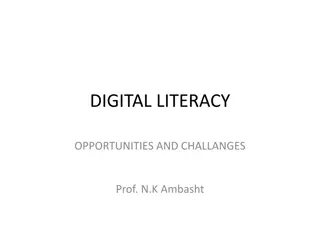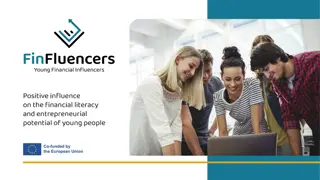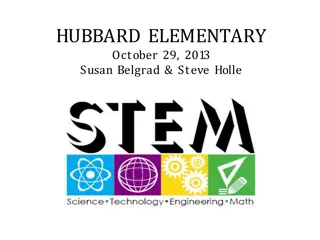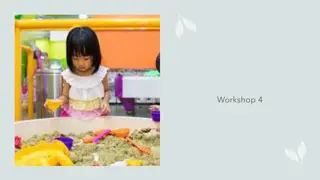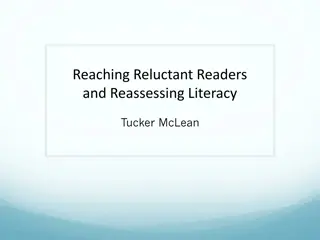Understanding the Reformed EYFS Literacy Programme
Deepen your knowledge of the reformed EYFS literacy programme with a focus on writing to support children's development. Explore changes to the statutory framework effective from September 2021 and the importance of literacy in early childhood education. Learn about transcription, comprehension, and
9 views • 81 slides
Literacy Coaches and Reading Specialists Program Overview
The Literacy Coaches and Reading Specialists Program, led by the California Department of Education, aims to enhance literacy outcomes for students. The program covers key aspects such as allocations, educator training, community building, and funding distribution to local educational agencies. The
2 views • 38 slides
Investigating EAP Assessment Literacy for IFP and Cross-Curricular Collaboration
This research project by Dr. Anthony Manning explores the implications and recommendations regarding EAP assessment literacy for the International Foundation Program (IFP) and cross-curricular collaboration. The study delves into defining assessment literacy, research objectives, relevant literature
3 views • 26 slides
Health Literacy in Rural Appalachia: Understanding the Impact and Needs
Health literacy is crucial in rural Appalachia where low literacy levels contribute to poor health outcomes. Understanding, supporting, and improving health literacy among the population can lead to better health decisions and reduced disparities in healthcare access and outcomes. This article explo
0 views • 16 slides
Understanding Text Features in Nonfiction Texts
Text features are essential components of nonfiction texts that authors use to enhance reader comprehension. They include elements such as tables of contents, indexes, glossaries, and titles, each serving a unique purpose in aiding readers to navigate and understand the content. By utilizing these t
1 views • 15 slides
Understanding the Impact of eHealth Literacy on Telehealth Preferences Post-COVID-19
The research explores the relationship between eHealth literacy and patient telehealth preferences after the COVID-19 pandemic. It highlights disparities in telehealth use among different demographics, emphasizing the importance of digital literacy for accessing healthcare services. The study aims t
0 views • 19 slides
Understanding Data Literacy: Models, Assessment, and Competency Frameworks
Data literacy is the ability to collect, manage, evaluate, and apply data critically. Various frameworks and models exist, such as competency models, evaluation frameworks, and teaching frameworks developed by organizations like the National Research Council of Canada. Core skills and competencies u
1 views • 79 slides
Understanding the Main Idea in Nonfiction Texts
In nonfiction writing, the main idea or central idea is crucial. It represents the most important points that tie all information together within a paragraph. Sometimes, the main idea is stated explicitly, while other times it is implied. Good readers identify key ideas by examining the entire text
6 views • 13 slides
Pennsylvania State Literacy Plan (PaSLP) Overview
Pennsylvania State Literacy Plan (PaSLP) aims to improve literacy learning outcomes by providing districts and charter schools with guidance and tools to develop local literacy plans, facilitate data-driven decision-making, and create 21st-century classrooms. The plan underscores key guiding princip
2 views • 26 slides
Exploring Information Literacy in Educational Frameworks
Delve into the world of information literacy through the lens of educational frameworks, evaluation approaches, and critical literacy connections. Understand the significance of information literacy in today's digital age, its role in lifelong learning, and its impact on active citizenship. Discover
3 views • 27 slides
Maximizing Literacy Achievement: Effective Instruction Planning Strategies
Timothy Shanahan from the University of Illinois at Chicago discusses key considerations for planning effective literacy instruction, including scheduling, amount of instruction, content to be taught, and the timing of instruction. Shanahan emphasizes the importance of providing ample literacy instr
0 views • 19 slides
Literacy Coaches and Reading Specialists Program Overview
State Superintendent of Public Instruction Tony Thurmond provided opening remarks at the December 5, 2022 webinar on the Literacy Coaches and Reading Specialists Program. The session covered program details, allocations, allowed expenditures, and additional supports. Participants engaged in a poll o
0 views • 44 slides
Enhancing Religious and Cultural Literacy for Effective Engagement
Explore the importance of religious literacy and competency in engaging diverse communities during disasters. Learn how to differentiate between literacy and competency, understand the needs of partners, provide culturally appropriate services, and build sustainable relationships. Continuous learnin
0 views • 20 slides
Developing a Comprehensive School Literacy Plan
Creating a school literacy plan is crucial for student success. Each school should have its unique plan, while districts can also develop one to support their schools effectively. The goal is to provide gold-standard literacy instruction, preparing students for college and career readiness. A synthe
2 views • 21 slides
Exploring Creative Nonfiction: A Comprehensive Guide
Creative nonfiction blends literary elements with factual storytelling, aiming to captivate readers with intriguing narratives. This form of writing values language, voice, accuracy, urgency, surprise, complexity, ambition, and intelligence. Writers of creative nonfiction craft pieces such as litera
1 views • 11 slides
Understanding Organizational Patterns in Nonfiction Writing
Explore the key organizational patterns in nonfiction writing through the lenses of cause & effect and compare & contrast. Learn how each pattern helps present information logically and clearly, with examples and interactive activities to enhance understanding.
2 views • 18 slides
Exploring Elements of Fiction and Nonfiction in Classroom Activities
Engage students in a week-long journey to explore elements of fiction and nonfiction through class activities centered around reading, discussion, vocabulary building, and comprehension quizzes. From learning terms and definitions to analyzing stories, students will enhance their understanding of di
0 views • 6 slides
Enhancing Early Literacy Skills through Learning Spaces and Activities
Explore Module 4 focusing on creating book-and-language rich learning environments for children to develop essential literacy skills. Discover strategies for modeling and practicing early language and literacy skills, and learn how to design learning spaces to promote conceptual knowledge. Aligns wi
0 views • 17 slides
Promoting Literacy Skills and Responsibility at St. Ninian's High School
Explore the comprehensive literacy program at St. Ninian's High School in Kirkintilloch, focusing on awareness, creativity, and integrity. The school emphasizes the importance of literacy skills in all subjects, offering workshops, activities, and support to enhance reading, writing, speaking, and l
3 views • 13 slides
Analyzing Nonfiction Texts: Comparing Structures and Evidence
Explore how two nonfiction texts, "Watch Your Driving, Kids" and an Allstate Foundation video, present statistics on teen car crashes and propose solutions. Dive into the authors' text organization and credibility, unveiling similarities in the texts' structures and evidence presentation.
0 views • 10 slides
Module 2: Literacy-Rich Environments and Experiences for Early Literacy Development
In Module 2, you will explore the importance of creating literacy-rich environments for young children to enhance language development. Reflect on positive interactions, intentional planning, and ways to engage children in meaningful literacy activities. Discover how classroom arrangements and mater
0 views • 14 slides
Master's in Language & Literacy: Trademark Outcome and Alignment with ILA Standards
The Language & Literacy Master's specialization aims to equip students with essential skills to become literacy leaders through in-depth knowledge and practical application of literacy methods. The program emphasizes the importance of sustaining professional collaboration and improving diverse learn
0 views • 17 slides
Understanding Fiction and Nonfiction in Language Arts
Fiction and nonfiction are two key genres in literature. Fiction involves imaginative storytelling with elements like plot, characters, setting, point of view, and theme. Nonfiction, on the other hand, deals with real people, events, and ideas, aiming to inform, persuade, or entertain readers. Explo
0 views • 14 slides
The Significance of Visual Literacy in Today's World
Visual literacy is increasingly crucial in our modern society, with children learning and communicating through images. Understanding the hidden messages in visual content is vital for effective communication and learning. As technology evolves, the connection between visuals and knowledge becomes m
0 views • 21 slides
Understanding Content Area Literacy vs. Disciplinary Literacy
Content area literacy focuses on improving reading comprehension and study skills across disciplines, while disciplinary literacy delves into discipline-specific ways of using text to create and evaluate knowledge. Expert reader studies and the specialization of literacy further highlight the nuance
0 views • 56 slides
Navigating Literacy Learning Journey: Early Years to Year 3 & Beyond
Explore the essential skills required for literacy development from early years to year 3 and beyond, focusing on print-based and language-based core literacy skills, functional literacy conventions of writing, and the oral and written language scales. Address challenges in consolidating spelling an
0 views • 13 slides
Understanding Patient Literacy in Healthcare
Assessing literacy in healthcare is crucial as it can be a barrier for patients in understanding medical instructions and information. Patient literacy is not always apparent, and formal assessments are needed to measure health literacy accurately. Using tests like REALM, TOFHLA, and NVS can help he
0 views • 39 slides
Developing Literacy Skills for Leadership Excellence
Enhance your speaking, reading, and writing abilities through a comprehensive program designed to transform your literacy skills. Join Teaching Leaders Residential in August 2015 led by Geoff Barton to uncover the secrets of literacy and improve your communication techniques. Explore essential topic
0 views • 89 slides
Understanding Common Core State Standards ELA/Literacy Focus - Shifts and Text Complexity
The Common Core State Standards for ELA/Literacy require three key shifts, emphasizing regular practice with complex text and academic language, grounding reading, writing, and speaking in textual evidence, and building knowledge through content-rich nonfiction. The importance of practicing with com
0 views • 33 slides
Financial Literacy and Education Commission: Coordinating Federal Efforts
Financial capability empowers individuals to manage financial resources effectively, make informed choices, avoid pitfalls, and improve their financial well-being. The Financial Literacy and Education Commission (FLEC) works to improve the financial literacy of individuals in the United States throu
0 views • 16 slides
Exploring Postmodernism: Literature, Poetry, and Nonfiction in the Contemporary Era
Delve into the Postmodern era from 1939 to the present, characterized by a blend of fiction and non-fiction, diverse narratives, and challenging traditional literary structures. Postmodern literature allows for multiple interpretations, blending different worlds and forms. Postmodern poetry, exempli
0 views • 9 slides
Enhancing Reading Comprehension Through Text-Dependent Questions
This resource delves into the significance of text-dependent questions in improving students' reading comprehension skills by emphasizing the importance of evidence from the text, building knowledge through nonfiction, and developing critical thinking abilities. It highlights key advances in educati
0 views • 16 slides
Empowering Communities Through Libraries and Literacy Advocacy
Education is fundamental for societal progress, and libraries play a crucial role in promoting literacy and knowledge dissemination. They serve as historical archives, educational hubs, and inclusive spaces for adult learners. The integration of literacy into library services enhances community outr
0 views • 6 slides
Understanding SOAPSTone: An Analysis Strategy for Nonfiction Texts
Explore the SOAPSTone strategy which breaks down nonfiction texts into Speaker, Occasion, Audience, Purpose, Subject, and Tone. Understand how these elements help in analyzing and interpreting written pieces effectively.
0 views • 17 slides
Exploring Disciplinary Literacy in Education
Educators have long emphasized the importance of content area reading to improve students' comprehension and study skills across various subjects. However, disciplinary literacy goes beyond basic reading skills, focusing on how different disciplines create, communicate, and evaluate knowledge throug
0 views • 42 slides
Exploring Digital Literacy: Opportunities and Challenges in Education
Explore the realm of digital literacy with a focus on adult education, functionality in changing times, and the impact on citizenship and economic development. Discover the intrinsic connection between literacy, language, and script, and how digital platforms are expanding knowledge sources. Delve i
0 views • 9 slides
Understanding Financial Literacy and Its Importance
Financial literacy is crucial in today's society as it involves knowledge of financial concepts, skills to make effective decisions, and confidence in financial matters. This module explores the definition of financial literacy, its importance for young people, and the impact of financial literacy a
0 views • 20 slides
Enhancing Nonfiction Literacy Through Science Education
Embrace the importance of nonfiction literacy intertwined with science education and engineering careers. Encourage students to delve into the world of factual reading and writing to make informed decisions in our ever-evolving society. Utilize the lives and work of scientists and engineers to spark
0 views • 15 slides
Understanding Literacy Beyond Traditional Approaches
Explore the expanded concept of literacy beyond traditional school methods like reading and writing, delving into emotional, social, and physical aspects. Discover how everyday experiences contribute to literacy development and its connection to language, culture, and background. Follow the story of
0 views • 21 slides
Understanding and Supporting Reluctant Readers in Literacy Education
Reluctant readers are a diverse group with various reasons for their reluctance. Strategies to engage and support struggling readers include creating a safe and supportive environment, interrupting negative thinking cycles with small successes, and providing high-interest, low-vocabulary nonfiction
0 views • 34 slides
